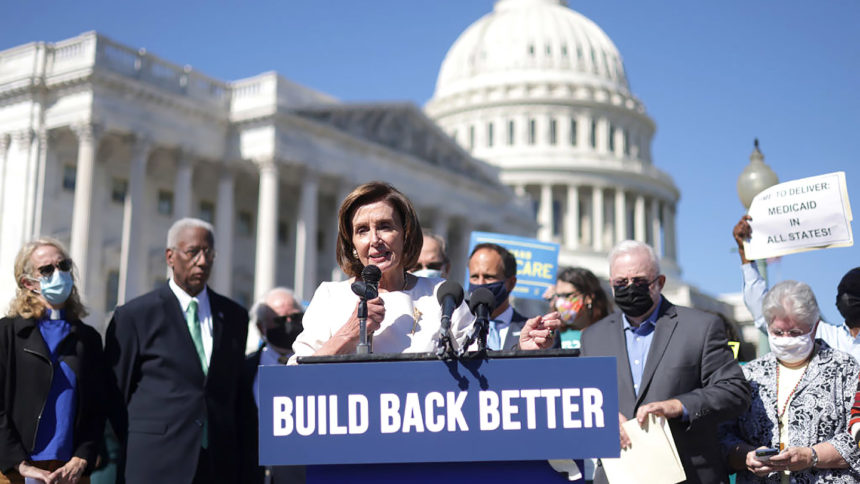
U.S. Speaker of the House Rep. Nancy Pelosi (D-CA) speaks during a news conference outside the U.S. Capitol on Oct. 20, 2021, in Washington, D.C., on President Biden’s Build Back Better agenda. (Credit: Alex Wong / Staff / Getty Images)
As the country waits for action on the historic $1.75 trillion social spending bill, long-term care advocates are ramping up campaigns angling to refocus attention on the sector.
Argentum said that it remains “deeply disappointed” that the Build Back Better Act still does not include senior living and is unlikely to be modified before it is considered by the House. The association signaled that “these next few weeks could not be more important to the future of the industry,” pinning hopes on Senate changes to the legislation.
Argentum also urged the administration to “reverse course” and target COVID-19 relief through the latest and final phase of Provider Relief Funds to assisted living and memory care communities.
The application deadline for Phase 4 of the Provider Relief Fund closed Nov. 3.
Argentum President and CEO James Balda said that the administration has the “sole ability to finally correct the great inequity in relief that assisted living and memory care caregivers have received.”
Senior living communities, he reiterated, have amassed $30 billion in financial losses while being awarded “scant allocations of federal relief.” Argentum also stated that “healthcare providers not directly in the crosshairs” of the pandemic, such as chiropractors, receive the same consideration for funding as assisted living frontline caregivers.
Argentum’s “Don’t Leave Us Behind, Again” campaign asks for targeted relief through the Phase 4 Provider Relief Fund, investments in the long-term care workforce, expansion of workforce development programs and support for administering COVID-19 vaccines and boosters.
Build Back Better
LeadingAge is calling on Congress to maintain — or increase — funding for provisions in the Build Back Better Act that would benefit workforce investment, affordable housing, home- and community-based services, and immigration.
Funding levels in the following key focus areas will directly affect how well the nation is able to meet the needs of older Americans, according to LeadingAge President and CEO Katie Smith Sloan.
Workforce
Among the long-term care workforce programs LeadingAge is advocating for include $1.6 billion in nursing home workforce training grants, which the association says would help all long-term care providers address staffing shortages through wage subsidies, tuition assistance, childcare and transportation.
Build Back Better also includes $245 million to expand Health Profession Opportunity Grants to train home care aides, certified nursing assistants, licensed practical nurses and nurses to work in nonprofit organizations and in skilled nursing facilities. Another $1 billion for direct care workforce competitive grants would add more than 1.3 million new direct care jobs as well as fund recruitment, retention and training.
Affordable housing
LeadingAge is calling on Congress to at least double the bill’s current $500 million for the Department of Housing and Urban Development’s Section 202 Supportive Housing for the Elderly program.
Without more affordable housing units, the bill’s HCBS and Money Follows the Person investments “cannot be realized and low-income older adults will continue to languish on the growing waiting lists for service-connected, affordable housing,” Sloan said.
HCBS
The association also is seeking the preservation of, or an increased investment in, the bill’s $150 billion for HCBS.
“This minimum investment will help ensure access to services so that all older adults are better able to get the help they need to age in place wherever they call home in an equitable manner,” LeadingAge stated, adding that it also would bolster wages of direct care workers.
Immigration
The updated version of the Build Back Better Act sent to the House Rules Committee on Nov. 3 also maintains most of its previous allocations and programming related to immigration.
Those provisions include a reprieve for at least 7 million undocumented individuals seeking legal status, providing them with temporary protections and a work permit. The bill also would help more than 2.2 million immigrants by implementing a visa recapture program to expedite a pathway to green cards and allocate funding to the U.S. Customs and Immigration Service to implement those initiatives.




